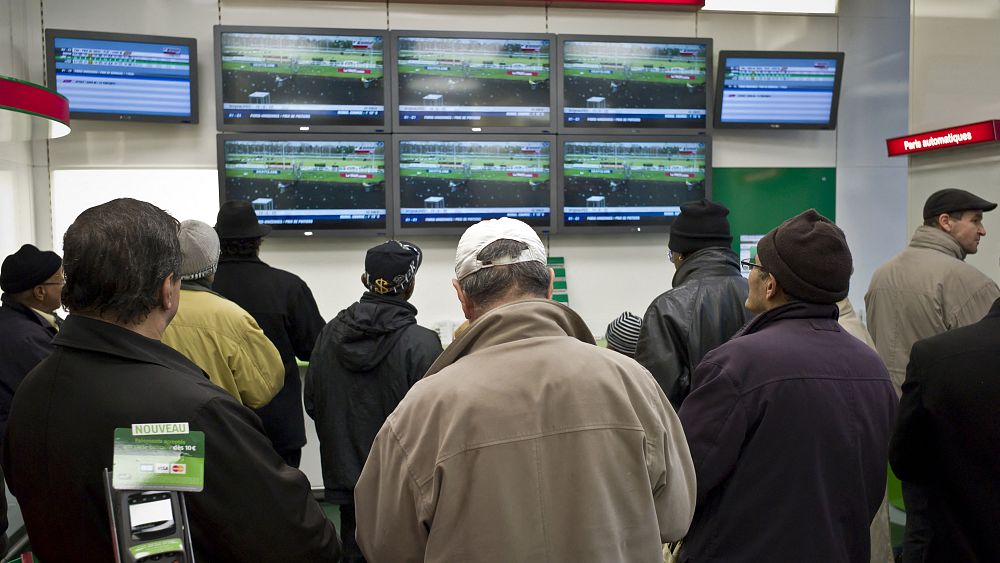
For Chris, his 18th birthday was more than a major milestone marking the transition between childhood and adulthood. It was the day he had been waiting for for years, the day he would be finally considered old enough to legally gamble in his home country, the UK.
“I always knew that gambling was going to be something I was going to do as soon as I turned 18,” Chris told Euronews. “That was the thing I was always most excited for because I grew up in such a footballing environment.”
Chris knew he wanted to bet on football matches. When his birthday came around, within a few days he was signed up to all gambling sites available, taking advantage of all offers available to newbies.
“To start off, my gambling was very responsible and controlled. It was just small amounts of money, probably on Saturday afternoon just when the football was on. Then quite quickly, that started to slowly spiral out of control,” Chris said.
He started betting a lot more money, using credit cards to support his gambling, on all sorts of sports — including horse racing, which he said never interested him in the first place.
“I was basically gambling every second of every day,” Chris said. “I went very quickly from my gambling being very responsible and controlled to just being absolutely ruthless. It very quickly took over my whole life.”
The situation got so bad that within a matter of hours of receiving his salary, Chris would place it all on bets. He got increasingly isolated from his family and friends, and developed suicidal thoughts.
A growing problem
Chris’ case is not an isolated one in the UK, or Europe, where gambling addiction is a growing issue.
In the UK, 53% of people aged over 16s are estimated to have made a bet last year, according to the Gambling Commission. Some 430,000 people in the country are considered addicted to gambling, and 1.85 million are at risk of becoming addicted.
The most recent population survey from Germany states that about 1.3 million individuals have a gambling disorder and another 3.25 million show some kind of risky gambling patterns. Other countries, like Sweden, have reported a surge in the number of women getting addicted to gambling.
An increasing number of Europeans suffer from gambling addiction. According to data from EGBA, between 0.3% and 6.4% of adults in Europe suffer from the condition which leads to compulsive betting, though collecting accurate data is made difficult by different national survey methods and tools.
It’s hard to get hard numbers on the number of Europeans who can be considered addicted to gambling. Gambling addiction is an under-researched area, and there’s a lack of comparative studies across different European countries which makes it harder to evaluate the actual size of the problem.
Experts expect the problem to get worse as the betting industry continues thriving in the coming years.

Europe’s sports betting industry is currently worth an estimated $44.5 million dollars (€41.5 million). Forecasters expected its value to reach $89.9 million (€83.9 million) by 2030, as reported by Data Bridge Market Research. This growth is expected to be led not by the unassuming sports betting shops scattered across the continent, which are only the tip of the iceberg of the betting industry, but by online gambling.
This is a grey area, from a legal perspective, across the EU. There is no sector-specific EU-wide framework for gambling, which leaves individual member states free to decide on their own regulation of online gambling “as long as they comply with the fundamental freedoms established under the Treaty on the Functioning of the European Union.”
Malta, which moved first to establish its own online gambling framework, is now one of the world’s leaders in the sector, with the industry now playing a key role in the country’s economy – and its people’s lives. A 2017 report revealed that 56% of Malta’s population – equal to some half a million people – aged over 18 spent money in some form on gambling in 2015.
“Internet gambling will certainly continue to gain in popularity over the next few years,” Dr Tobias Hayer of the University of Bremen, Germany, told Euronews.
“This means a massive increase in gambling incentives and also addiction risks. Due to the event characteristics of online gambling, such as the permanent availability 24 hours a day, 7 days a week, the lack of social control, fast event frequencies and cashless payment transactions, these offers go hand in hand with a high risk potential,” he said.
“One important discussion we need to have in this context is: Who is responsible for responsible gambling? What are the tasks of the providers, what must be done by the state authorities, and what can be left to the forces of the market?,” Dr. Steffen Otterbach and Andrea Wöhr from the Gambling Research Center, University of Hohenheim, Germany, told Euronews.
How to protect people from gambling addiction?
In Chris’ case, his parents eventually caught up on the fact that he had run up a lot of debts, and since then, he has started his way to recovery from gambling addiction.
Chris, now 25 and 5 months gambling-free, has become an advocate for raising awareness about gambling addiction, sharing his experience on TikTok and through his website NoBet.
His recovery hasn’t been easy.
“I tried my hardest, but when I put the TV on, there would be a TV advert [for gambling]. I walked down the street, there’s gambling on billboards. I watched YouTube videos and 9 times out of 10 there would be a casino advert. Same on social media, it’s just everywhere. I felt very trapped,” he said.
The aggressive campaign to promote sports betting online and on the streets of our cities makes real damage, Chris said. “I think the way that companies advertise is just sickening and plain wrong,” he told Euronews. “On these advertisements, there’s a tiny bit at the end that would say ‘take time to think’, but it’s not enough. Gambling is so extremely addictive, and so destructive.”
In the UK, between 250 and 650 suicides a year are estimated to be gambling-related, according to 2021 data.
Chris thinks that the gambling industry should be forced to warn customers of the dangers of gambling addiction as the tobacco industry warns of the risk of lung cancer posed by smoking.
Belgium has gone even further, announcing in March that it will ban gambling ads on social media, TV, and sports stadiums.
Hayer thinks that it’s up to national governments to impose similar bans, because gambling companies would never do so of their own volition. “Effective player protection costs money from the provider’s point of view, and hardly any private company pursuing the business model of revenue maximisation is willing to accept such revenue losses,” he said.
But regulating the gambling industry is a process still in the making in many countries, which are approaching the issue differently in the absence of a common framework.
“We do see large efforts to tackle gambling addiction in the individual European countries but there is still a long way to go,” Otterbach and Wöhr said. What would be helpful, the two believe, would be to have more comparative studies about how the problem is being tackled across Europe.
“A key starting point for minimising these costs is structurally-implemented prevention measures such as significant restrictions in advertising including social media marketing, limitations on gambling opportunities including mandatory stake or loss limits and a functioning supervisory authority,” Hayer said.
“At the same time, there is a need for better funding of the help system, preventive activities and independent research. To sum up: Individual companies must not be allowed to profit from gambling at the expense of society.”
Should the EU intervene?
Whether the EU should have a role in regulating the gambling industry for all member countries is something experts are unsure about.
“This is a very good question, as it concerns the tension field between national and EU-wide legislation,” Otterbach and Wöhr said. “For a layman in legal matters, it might seem preferable to have a unified regulation for all EU countries. It is however doubtful whether ‘one size fits all’ — after all, a common regulation challenges the way in which regulatory issues are organised in the individual countries.”
“An EU-wide legal framework would certainly be welcome in essence, but not a very realistic scenario,” Hayer said.
“The various countries have the right to regulate their national gambling market according to their own interests and concerns. And Malta acts completely differently than Germany or Norway, for example,” he continued.
“My suggestion would be to set up a kind of a pan-European ombudsman institution for gambling matters. The guiding principle of this institution would always be to strengthen the protection of young people and gamblers as well as to avert the dangers of gambling addiction.”





